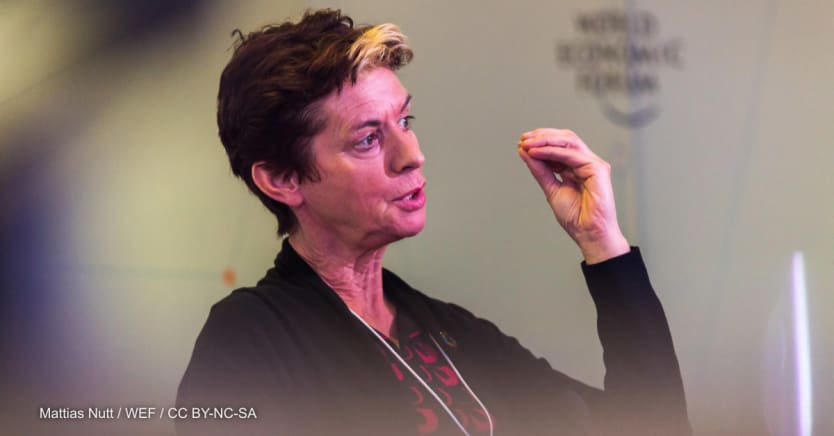
Food took center stage at this year's U.N. Climate Change Conference as the world continues to grapple with a food and nutrition crisis fueled by climate change and conflict.
In response to the dual shocks, the Scaling Up Nutrition Movement, or SUN, set out to build a stronger alignment between climate and nutrition finance from donors at COP 27.
Devex sat down with United Nations Assistant Secretary-General Gerda Verburg, who leads the movement, to talk about SUN’s push for more investment in climate-resilient, nutrition-sensitive food systems.
She said that while countries are beginning to realize the importance of the climate-food-nutrition nexus, a lot more needs to be done to integrate the agendas. “Funding alone will not do the trick,” she said. “It is about people and leadership.”
This conversation has been edited for length and clarity.
Food systems were a big part of the agenda at COP 27. Do you think people are realizing the importance of the climate-food-nutrition nexus?
I think so. Yes, because people out there experience it day in and day out. Even in Europe and the United States — in the so-called developed world — this year has been another alarm bell after the COVID[-19] alarm. So how much of a wake-up [call] do we want? The question is now, how to do it?
Food and food systems and nutrition are all over [COP] because leaders also realize that filling the stomach is not good enough anymore. If you want to make progress, if you want to invest in the next generations, if you want to invest in the prosperity of your countries, you need to build the bodies, but also the business development. And that's what nutrition — the right foods, and the right nutrition or the diversity and tackling unhealthy diets will bring.
So I'm quite optimistic with this. However, the “how” is not being discussed enough right now. And that is the homework for each and everyone that we as a movement want to bring to the table.
How do we institutionalize food systems in the climate agenda?
That is the important point, but it should not only be on the agenda, but also in the research in the negotiations and in the investment. And that requires navigation. I was around as minister of agriculture when agriculture and food were considered an enemy of climate and of our planet, and for good reasons because food production is one of the biggest emitters still.
However, right now, billions of people experience … that the climate now and the climate disasters are the enemy of people's food security and nutrition. So we now have two enemies. And if we want to find solutions, they can't afford to keep their backs to each other. ... They need to turn around and find joint solutions.
Investing in climate-smart, nutrition-sensitive, diverse food production, will serve both the climate — because it will improve the soil and it will improve the water use if it's done in a smart way — [and] the farmers and the communities that are there.
And how exactly do we do this?
I think the food and nutrition people need to learn the rules of the [climate] game because the climate experience is already much further than the food experience and the food systems experience.
What are the rules of the game? How do we understand the rules of the game, because you first need to understand the rules of the game before you can start a discussion on how to change them and how to broaden them.
We need to broaden [the International Plant Protection Convention] and ask the climate people to include food systems and nutrition in their next report, and from now onward to really also combine the research and create the recommendations and [identify] the opportunities and the threats to support countries in building joint investment cases at the country level.
A lot of billions are committed [to climate change], but a lot of billions are still somewhere on the shelf. Why? There are … no clear business cases. … This is what I hear. And it's a shame for the climate, but also for the people who are suffering.
How can donor countries support this process?
I'm sorry to say, but sometimes developed countries and so-called donor countries still think that they need to tell developing countries what to do and how to do it. Let's stop patronizing. Let's stop being neocolonialistic. Let's stop [holding] the developing countries to account [for] the last detail before you submit your money. Come on, look around, look at everybody who caused all these problems.
I'm not in favor of a revolution. But I can understand that these developing countries are knocking on the door and saying, “Hey, guys, come on. Where is climate justice? Where is human rights justice?” The moment is now to act and to come forward and not be climate egoistic.
The secretary-general [António Guterres] mentioned it … in his speech. He was extremely outspoken, [he described how] … rich countries are very often climate egoistic and they don't understand the long-term impacts. Because if people cannot continue to live in their own country, where they are born, and raised, and where they are connected to, where do they go? They will come to developed countries.
So for that reason, I'm very frank with developed countries and donor countries — be more generous and be ready to stand shoulder to shoulder and not be there and tell developing countries what to do because you have a lot to learn.
Update, Dec. 1, 2022: This article has been updated to reflect Gerda Verburg’s full title.








